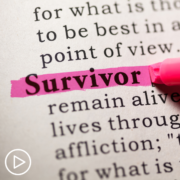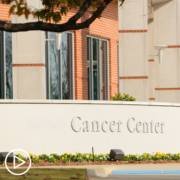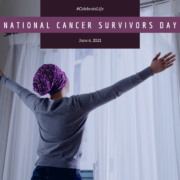Cancer Survivorship | Ongoing Healthcare and Follow-Up
Cancer Survivorship | Ongoing Healthcare and Follow-Up from Patient Empowerment Network on Vimeo.
Dr. Kathleen Ashton explains what a cancer survivorship care plan is, what to expect following after active treatment, available survivorship tools and resources, and she reviews follow-up care for cancer survivors.
Related Resources:
 What Does Cancer Survivorship Mean? What Does Cancer Survivorship Mean? |
 Cancer Survivorship | The Positive Impact of Peer Support Cancer Survivorship | The Positive Impact of Peer Support |
 Navigating Obstacles to Empowerment That Can Lead to Better Health Navigating Obstacles to Empowerment That Can Lead to Better Health |
Transcript:
Katherine Banwell:
Dr. Ashton, we often hear about the importance of creating a survivorship care plan. What is that exactly, and where do you and a patient start when you’re creating such a plan?
Dr. Ashton:
That survivorship care plan is such an important part of the process. I think for many patients it really helps relieve a lot of anxiety. When you’re finished with your active treatment there’s really a thought of what next, right?
You’ve just gone through surgery or chemotherapy, radiation; you’ve been actively treating the cancer, and then you’re kind of left like, what is this new normal? So, one of the things we do at the Cleveland Clinic is patients have a survivorship visit. So, it’s either with their oncologist or with a nurse practitioner, and they spend an hour with the patient and go through what are all the treatments you’ve done? What’s your plan for the next five years? How often do you come in to see your doctor? What kinds of tests are you going to get, what kind of scans? What you need to be looking for? What would be a sign of something to be concerned about? And then a big part of that plan is also the lifestyle changes that occur in survivorship. So, eating a healthy diet, exercising regularly, stress management, getting enough sleep. And that’s where as a psychologist a lot of times I come in.
We have a group called Breast Cancer STAR (Survivorship Tools and Resources), so it’s a five-week program for our survivors to work on changes with lifestyle, stress management, all of those changes in their life moving forward.
And that’s a virtual group program where survivors can talk to each other about that survivorship plan as well as learn some skills to take with them.
Katherine Banwell:
It’s great to have that support. We know that this varies by cancer, but what is the typical follow-up that occurs when monitoring for recurrence?
Dr. Ashton:
So, I usually would probably leave that question to the oncologist, and so many different kinds of breast cancer are going to have different kinds of monitoring. But very often that first-year patients will check in with their oncologist every three months. They’ll have a breast exam at many of those visits. If they still have breast tissue, then they would have mammograms or possibly MRIs. So, there’s some scans that go along with that. And many patients are also on ongoing medications or treatments that go for sometimes several years after their initial breast cancer diagnosis.
So, they would be checking in with their oncologist on those medications at each visit as well.
Katherine Banwell:
Erica, the follow-up care that goes along with being a survivor can be anxiety inducing or cause some call it scan-anxiety. What advice do you have for coping with these types of emotions as a survivor?
Erica Watson:
As a survivor I will have my first scan next month, but I would just encourage survivors to just be okay with the process, ask questions, as many questions as they possibly can, take someone with them, which was suggested to me.
I don’t have anxiety necessarily about the scans. My breast cancer was detected by pain or through pain, so I experienced anxiety with that, any kind of breast pain that I experienced from surgery or radiation therapy. And I also would just advise the patient or survivor to just experience the process, allow themselves to be afraid, talk through the reality of what’s really going on, talk through the fact that they had all the treatments, they did everything that was in their control as far as going to the appointments, getting all the care, to stop the reoccurrence.
Katherine Banwell:
Dr. Ashton, primary and preventative care continues to be essential regardless of someone’s diagnosis. What tips do you have for keeping up with overall health and well-being?
Dr. Ashton:
Yeah, I think as women we often put ourselves last in the priority list. And for breast cancer survivors, well-being is incredibly important. And I tell patients it’s not an optional thing or something that you’re being selfish by doing, it’s actually part of your prescription as a survivor. So, the time that you take for stress management, whether it’s meditation or being outdoors or whatever brings you joy is really part of your prescription for wellness in survivorship. Exercise is incredibly important. They recommend for survivors 150 minutes of exercise a week and two days of weight training, keeping your weight normal.
So, all of the healthy eating, healthy habits are actually what’s going to help prevent recurrence. And they’re things that or in patients’ control, so that feels good too to be able to take that time and recognize that it’s an essential part of their health, not an optional part.










